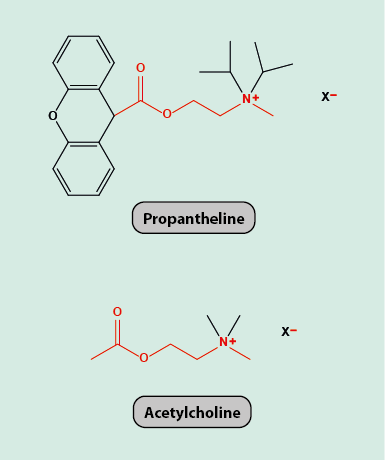Propantheline
Propantheline belongs to a large group of medicinal drugs, it is an anticholinergic agent. This group of medications reduces or modifies some of the actions of acetylcholine. Acetylcholine is a neurotransmitter (a signalling chemical that is released in the synapses between nerve ends and muscles) that is involved in a very larger number of both voluntary and involuntary body functions. Figure 1 compares the molecular structures of propantheline and acetylcholine.

Amongst its many effects on the parasympathetic nervous system (part of the autonomic nervous system), acetylcholine enhances the secretion from tear, sweat and salivary glands. Propantheline hinders this action by binding to the receptor that would normally bind acetylcholine (the antimuscarinic receptor) in these glands, but it also has a direct relaxing effect on smooth muscles (for example, in the digestive tract).
In maxillofacial surgery, propantheline is prescribed to reduce saliva production (another agent, hyoscine, can be used for the same purpose). Interestingly, botulinum toxin (‘botox’) acts not by blocking an acetylcholine receptor but by suppressing the release of acetylcholine. Generally, propantheline is mostly prescribed to reduce excessive sweating (with the obvious adverse effect of causing dry mouth (xerostomia) problems in those circumstances).
In common with many other anticholinergic drugs, and probably not surprising given the role of acetylcholine as a neurotransmitter in so many different body functions, propantheline has a number of adverse effects. Nature also exploits the multiple roles of acetylcholine: many plant- and animal-derived toxins block, hinder or mimic the various actions of acetylcholine in metabolism.